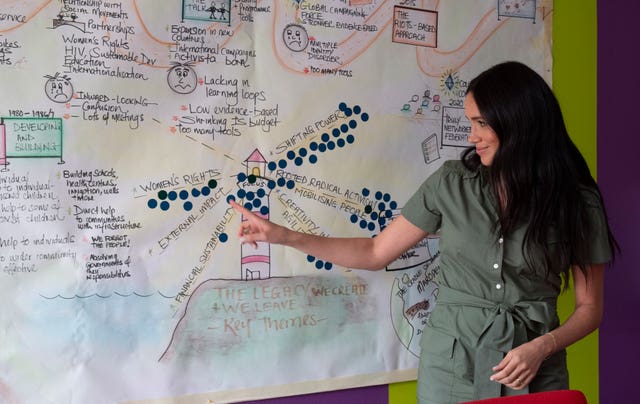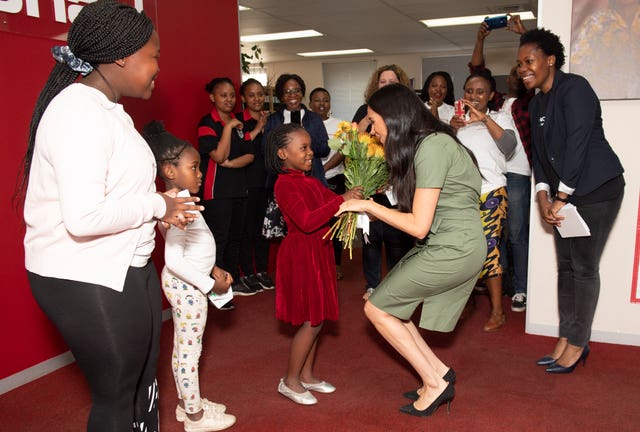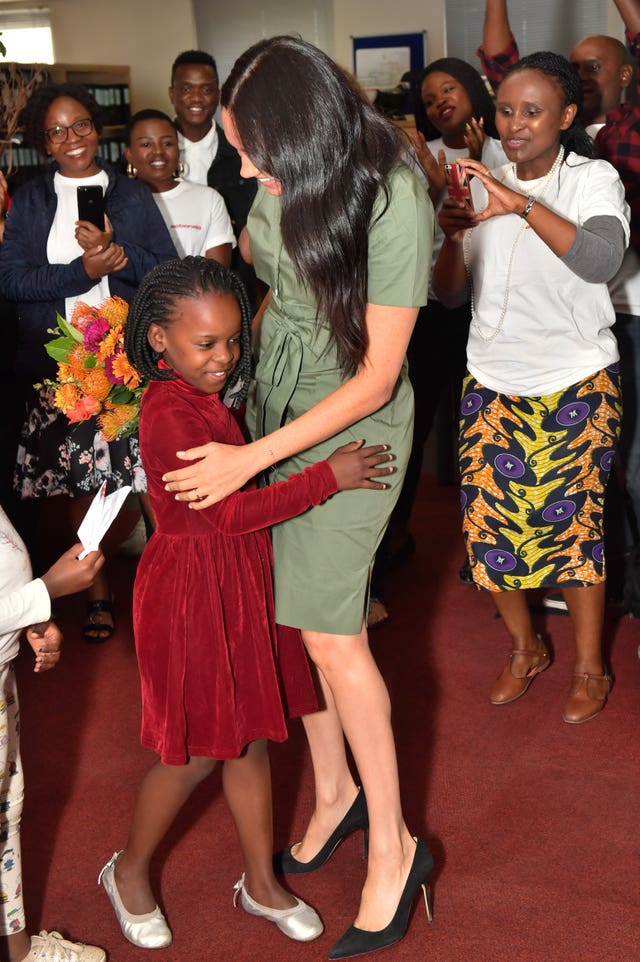
The Duchess of Sussex tackled the troubling issue of gender-based violence on the penultimate day of her official tour of South Africa, saying the country was at a “crisis state”.
Meghan, 38, had been keen to speak to girls and campaigners in Johannesburg about the issue, as she has done in Cape Town, following a spate of brutal attacks against women in South Africa that has shocked the nation.
Women have taken to the streets in their thousands to protest against the growing levels of violence against women and the country’s president has publicly acknowledged the issue.
During a meeting at the organisation Action Aid, which campaigns for social justice, particularly on women’s issues, Meghan took part in a round-table discussion with Professor Rachel Jewekes, executive scientist for research strategy at the South African Medical Council, Bafana Khumalo, director of strategic partnerships at Sonke Gender Justice, and Elizabeth Steenkamp, programme manager at Teddy Bear Clinic.
Professor Jewekes talked to the duchess about how important it was to address the issue of gender-based violence across all age groups at schools, as well as different types such as peer violence, as well as dating and sexual violence.
He also explained how much of their work focused on building healthy relationships and encouraging communication around those relationships – particularly bringing parents into the equation.
Nodding intently, Meghan said: “Process, yes.”
She continued: “We need a shift in that paradigm. You can’t do that without some of the cultural context. To your point, it is at a crisis state here and the age range that it is happening at is really staggering.
“So what are you seeing in terms of progress, in terms of going into their homes, behaviour and having that interaction with the parents as well, especially the patriarch, to be able to shift, what that conversation is like?”
Mr Khumalo talked to the duchess about patriarchy and the levels of violence against women by men and how there was an acceptance in South Africa that they could do this without impunity.
“We must challenge men and hold them accountable for their actions,” he said.
“And boys,” Meghan interjected.

Nondumiso Nsibande, country director of ActionAid South Africa, discussed the need to have more community consciousness over issues of gender equality, and how many girls the group works with simply do not feel safe at school.
“The trouble is as a young girl if you are not feeling safe at school and not feeling safe at home, where does that leave you? And that really is systemic. That is a huge issue,” Meghan replied.
“You will feel very displaced.”
She added: “And when they tell somebody, someone does something. That’s the other issue right? It’s so key being able to feel that they can communicate what’s happening when something goes wrong, whatever it is.
“Talking to locals throughout some of our time here this past week, whether that be the church or that’s in your community… but within that community everyone is saying ‘well that’s just what is done, that’s just how it is’, and you’re shamed into not coming forward. It’s so normalised. You’re shamed into not talking about it, even though you are the victim.
“So I think you’re right and [need) to really open that door to conversation, when the entire community, the holistic approach, needs to really be on the same page or you are not incentivised to say anything.”
She added: “There’s no piece of this conversation that can’t be had without addressing the mental health aspect. The ripple effect of the young girls who were affected by it and then their siblings, their community…. as you say this is generational, this is cultural, norms are passed down and understanding and acceptance is passed down, so there is a mental health aspect for everyone there.
“But you’re right, if you are doing this work with these young girls then it is trying is some way to break the cycle.”
As she arrived, Meghan, wearing a khaki shift dress and heels with a pair of earrings she bought in Cape Town by a local ethical jewellery brand, Pichulik, was given a pretty posy of flowers by three girls whose mothers work for Action Aid – Luyanda, eight, Kadisha, five, and Kaliso, 13.


Luyanda rushed forwards, curtsied and gave smiling Meghan a big hug. The royal put her arms around the little girl and hugged her back, sinking to her knees.
The three girls then gave her drawings they had made especially for her. Luyanda said afterwards that hers “was love”.
Asked what love looked like, she said: “I drew a heart and clouds above it and a cross below.”
“She was beautiful,” she added.
Lindelwe Nxumalo, 37, women’s rights manager at Action Aid, said: “I think through her interest and passion in supporting women’s issues around the world she is able to put a spotlight on what we are trying to achieve. For her to highlight the issues going on here, particularly violence against girls, is another shot to our government.”
Later Meghan privately visited a classroom at a local school where an after-school girls’ club meets.
She met a number of girls between the ages of 12 and 16 who are members of the club, some of whom have been victims of violence.
A member of staff from an organisation called Teddy Bear Clinic Group talked her through how the club had helped the girls. The meeting was private due to the sensitivity of the issues being discussed and the age of the pupils.


Comments: Our rules
We want our comments to be a lively and valuable part of our community - a place where readers can debate and engage with the most important local issues. The ability to comment on our stories is a privilege, not a right, however, and that privilege may be withdrawn if it is abused or misused.
Please report any comments that break our rules.
Read the rules here